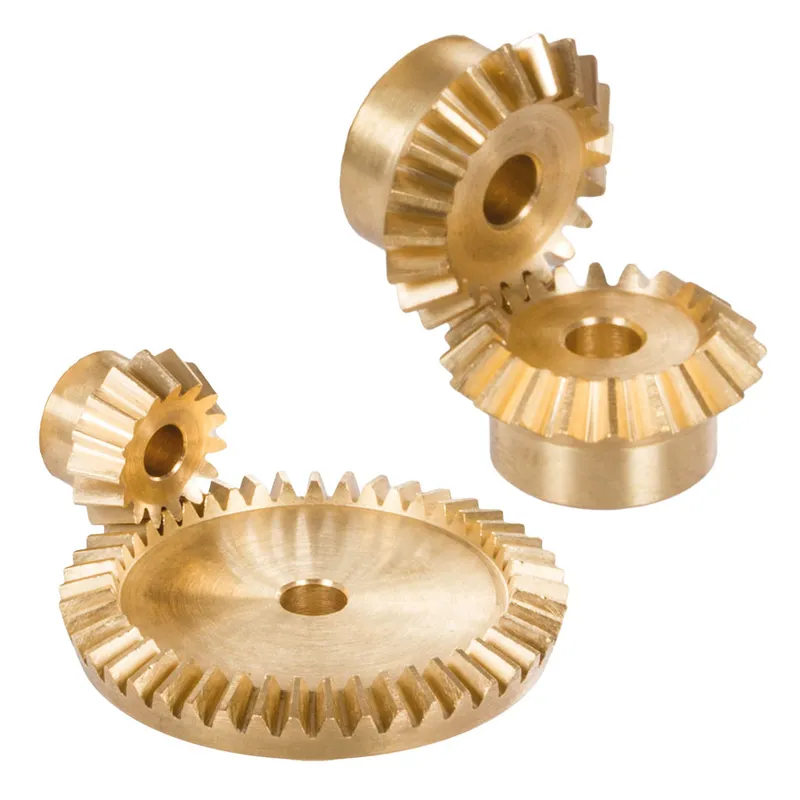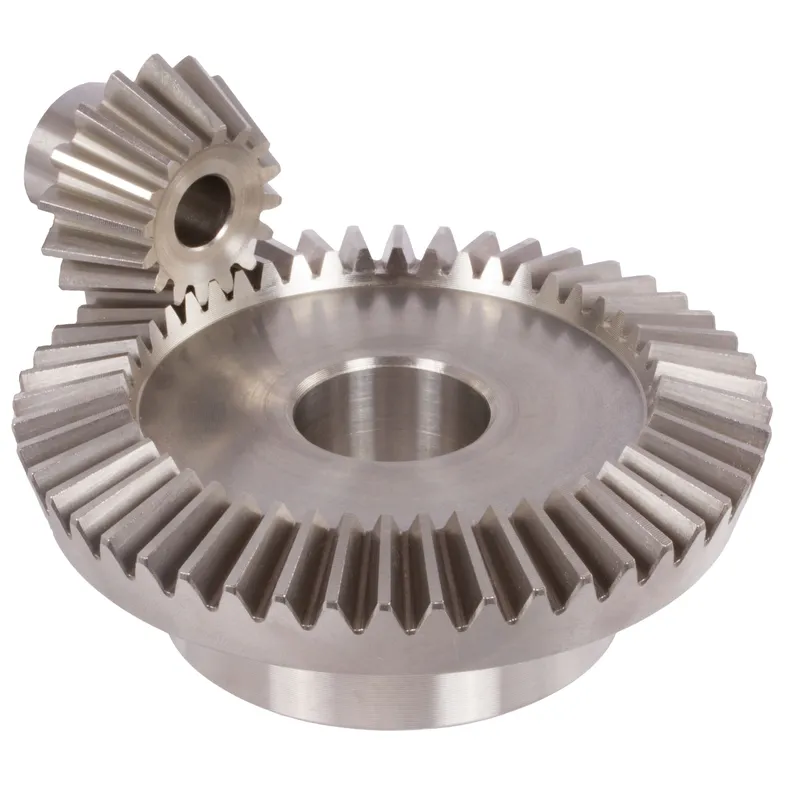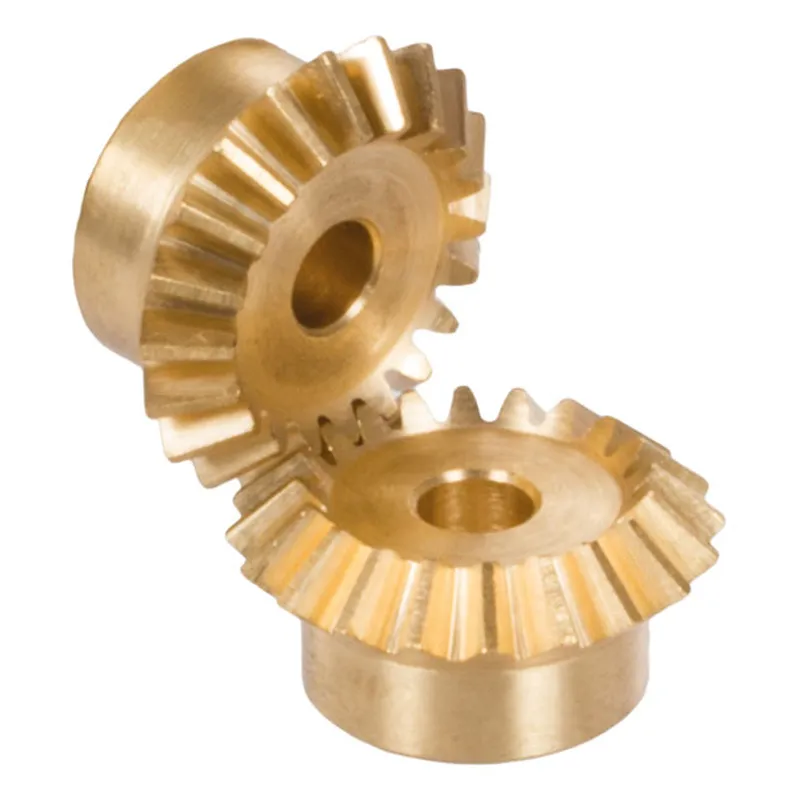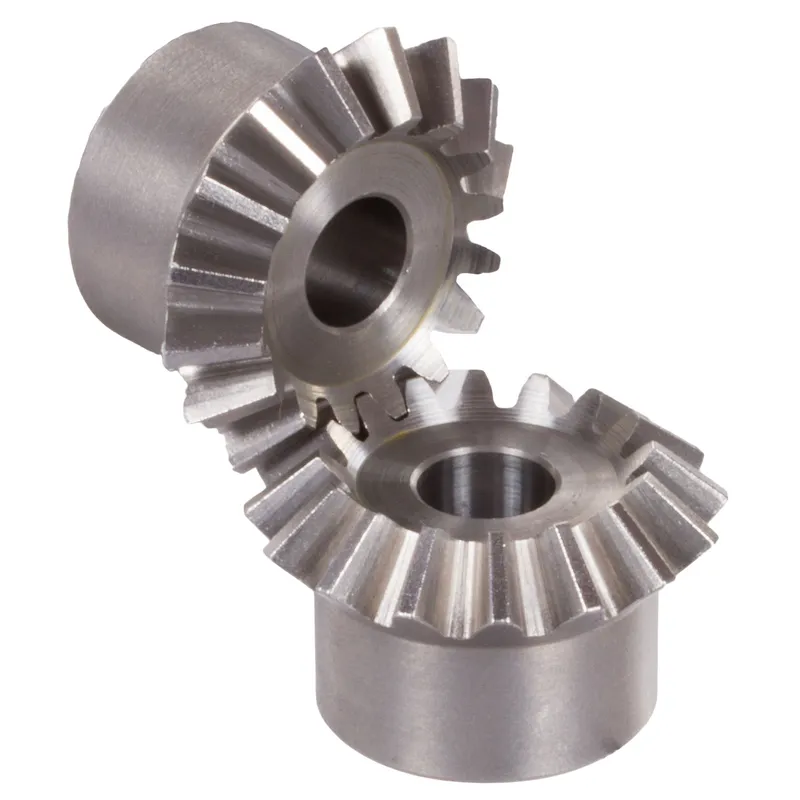Polyacetal Resin Plastic Bevel Gear Ratio 1:1 Straight Tooth System
The polyacetal resin plastic bevel gear ratio 1:1 straight tooth system is a mechanical component designed for efficient power transmission between intersecting shafts, typically at 90-degree angles. Made from polyacetal resin plastic, a durable and low-friction thermoplastic, these bevel gears are valued for their lightweight properties, resistance to wear, and excellent dimensional stability. These gears are commonly used in industries such as robotics, automotive, and machinery due to their corrosion resistance and ability to operate without requiring lubrication in dry environments.
The polyacetal resin plastic bevel gear ratio 1:1 straight tooth system is a mechanical component designed for efficient power transmission between intersecting shafts, typically at 90-degree angles. Made from polyacetal resin plastic, a durable and low-friction thermoplastic, these bevel gears are valued for their lightweight properties, resistance to wear, and excellent dimensional stability. The 1:1 gear ratio signifies that both gears have the same number of teeth, resulting in equal rotational speeds between the driving and driven shafts.
The straight tooth design ensures simplicity in manufacturing and operation, making it ideal for low-to-medium-speed applications where torque requirements are moderate. These gears are commonly used in industries such as robotics, automotive, and machinery due to their corrosion resistance and ability to operate without requiring lubrication in dry environments.
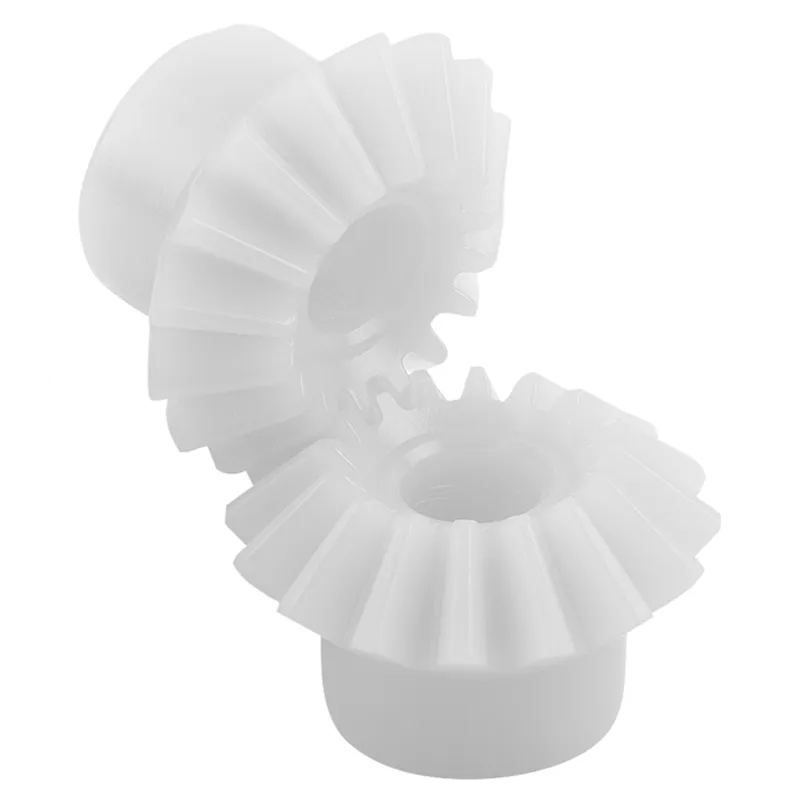
Polyacetal Resin Plastic Bevel Gear Ratio 1:1
 | 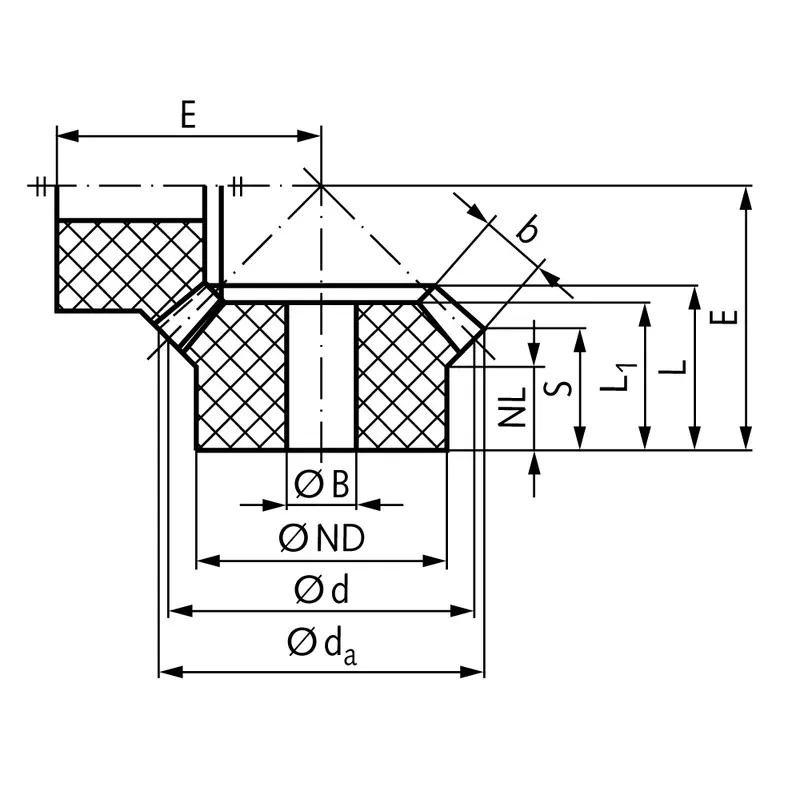 |
| Module | Number of teeth | da | d | ND | NL | L1 | L | S | b | B | E | Torque* | Weight |
| mm | mm | mm | mm | mm | mm | mm | mm | mm | mm | Ncm | g | ||
| 0,5 | 16 | 8,7 | 8 | 7 | 6 | 8 | 8 | 6,6 | 2 | 3 | 10,5 | 0,9 | 0,3 |
| 1 | 16 | 17,6 | 16 | 12 | 8 | 13,6 | 13,6 | 10,6 | 4,7 | 5 | 18,4 | 8,3 | 2,0 |
| 1 | 30 | 31,4 | 30 | 15 | 7,4 | 12,9 | 15,3 | 10,8 | 7,4 | 6 | 24,8 | 58 | 6,0 |
| 1,5 | 16 | 26,4 | 24 | 18,5 | 10 | 16,2 | 18,4 | 14,4 | 7 | 8 | 25,8 | 29 | 6,0 |
| 2 | 16 | 34,9 | 32 | 21,9 | 9,6 | 18,3 | 21,2 | 14,9 | 10 | 10 | 30,4 | 73 | 10,8 |
| 2,5 | 16 | 43,5 | 40 | 25,2 | 11,5 | 22,9 | 25,5 | 18,2 | 12,3 | 12 | 37 | 145 | 20,0 |
| 3 | 16 | 52,3 | 48 | 28,8 | 13,2 | 25,8 | 29,2 | 20,6 | 13,8 | 14 | 43 | 250 | 31,0 |
| 3,5 | 16 | 61,4 | 56 | 33,3 | 14,4 | 28,1 | 33,1 | 22,8 | 15,8 | 18 | 49,5 | 440 | 47,0 |
Plastic Straight Bevel Gear Design Features
- Material Composition
Plastic bevel gears are typically made from engineering plastics such as polyacetal, nylon, or PEEK. These materials offer excellent wear resistance, lightweight properties, and self-lubricating capabilities, which reduce maintenance requirements and ensure smooth operation even in dry environments. - Straight Tooth Geometry
The straight tooth design of these gears ensures uniform load distribution across the gear teeth. This geometry simplifies manufacturing processes and is ideal for applications where moderate torque and low-to-medium speeds are required, providing reliable performance in precision-driven mechanisms. - Lightweight and Corrosion Resistance
Plastic gears are significantly lighter than their metal counterparts, reducing the overall weight of systems. In addition, they resist corrosion, making them suitable for humid or chemically exposed environments, such as food processing machinery or outdoor equipment. - Noise Reduction Capabilities
Plastic straight bevel gears operate quietly compared to metal gears due to the inherent damping properties of the plastic material. This makes them ideal for applications in noise-sensitive environments such as office equipment, medical devices, and household appliances. - Dimensional Stability
High-quality plastic bevel gears are manufactured with precise tolerances, ensuring consistent dimensions and performance. Materials like polyacetal provide low thermal expansion and moisture absorption, maintaining accuracy and functionality even under varying environmental conditions. - Ease of Customization
Plastic gears are easily moldable, allowing manufacturers to customize designs to specific requirements, such as unique tooth profiles or lightweight structures. This flexibility makes them suitable for prototyping, small-batch productions, and specialized machinery configurations in diverse industries.
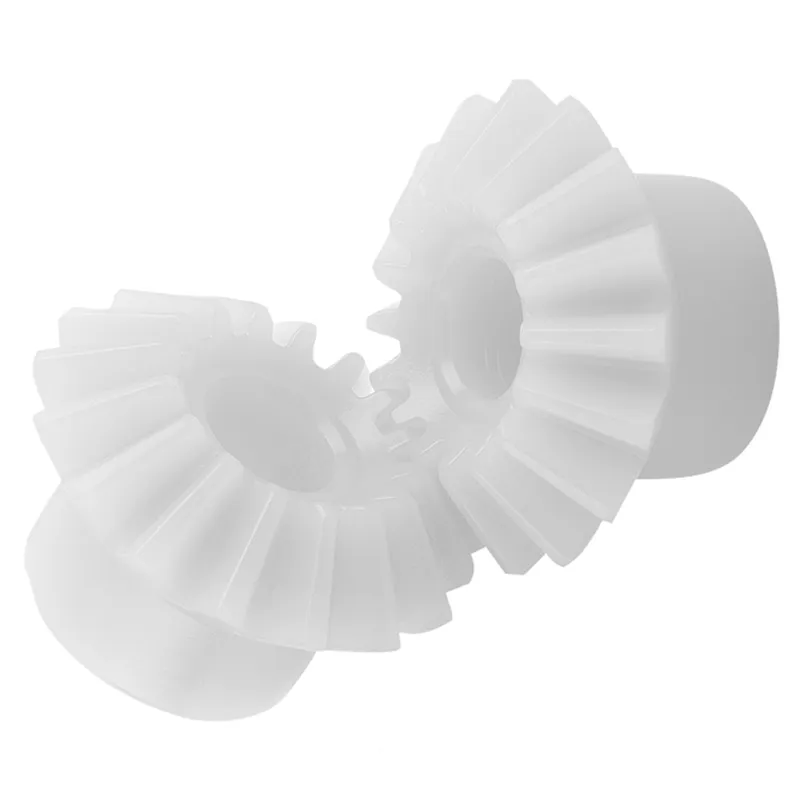
Plastic Bevel Gear Application Fields
- Automotive Industry
Plastic bevel gears are widely used in automotive systems, including windshield wipers, power seat mechanisms, and air conditioning systems. Their lightweight nature and low noise operation make them ideal for improving energy efficiency and passenger comfort while maintaining durability under varying environmental and mechanical stresses. - Medical Equipment
In medical devices such as infusion pumps, dental tools, and diagnostic machines, plastic bevel gears provide precise motion control with minimal noise and vibration. Their corrosion resistance and ability to operate lubrication-free make them suitable for hygienic environments where cleanliness and reliability are critical. - Robotics and Automation
Robotic systems and automated machinery often utilize plastic bevel gears for lightweight and precise power transmission. Their self-lubricating properties and customizable designs enhance performance in applications such as robotic arms, conveyor systems, and pick-and-place machines, where efficiency and quiet operation are essential. - Consumer Electronics
Plastic bevel gears are integral to devices like printers, scanners, and cameras, where compact and noise-free operation is required. Their ability to function without lubrication and their resistance to wear ensure durability and consistent performance in small, high-precision electronic mechanisms. - Aerospace and Aviation
In aerospace applications, plastic bevel gears are used in lightweight systems such as seat adjustment mechanisms, onboard instrumentation, and ventilation systems. Their resistance to corrosion and ability to withstand variable temperatures make them ideal for demanding conditions in aircraft environments. - Industrial Machinery
Plastic bevel gears are frequently employed in industrial machinery for tasks such as material handling, packaging, and food processing. Their resistance to moisture and chemicals, combined with smooth and quiet operation, ensures reliable performance in environments where metal gears may corrode or require excessive maintenance.
 |  |
| Bevel Gear for Robotics and Automation | Bevel Gear for Consumer Electronics |
 |  |
| Bevel Gear for Medical Equipment | Bevel Gear for Aerospace Industry |
Choose the Right Plastic Bevel Gear
- Material Selection Based on Environment
Consider the operating environment when selecting the gear material. For humid or chemical-prone conditions, materials like polyacetal or nylon are ideal due to their corrosion and moisture resistance. For high-heat applications, advanced plastics like PEEK provide excellent thermal stability and long-term reliability. - Load and Torque Requirements
Evaluate the load and torque demands of your application. Plastic bevel gears are suitable for moderate torque levels, but exceeding their load limits can lead to premature wear or failure. Ensure the gear’s strength and load capacity match the mechanical requirements of your system. - Speed and Noise Sensitivity
If the application involves high-speed operations, choose plastic gears with precision-engineered teeth to minimize vibrations and wear. For noise-sensitive environments, such as medical devices or consumer electronics, opt for materials with superior damping properties to ensure quiet and smooth performance. - Gear Ratio and Tooth Design
Select the appropriate gear ratio based on the desired speed and torque transmission. Additionally, ensure the tooth design, such as straight or spiral, aligns with the application’s requirements. Straight teeth are simpler and cost-effective, while spiral teeth offer smoother engagement and reduced noise. - Dimensional Precision and Tolerances
Confirm that the gear’s dimensions and tolerances meet the exact specifications of your machinery. High-precision plastic gears are essential for applications requiring accurate motion control, as improper fits or misalignments can lead to inefficiencies, noise, or mechanical failures.
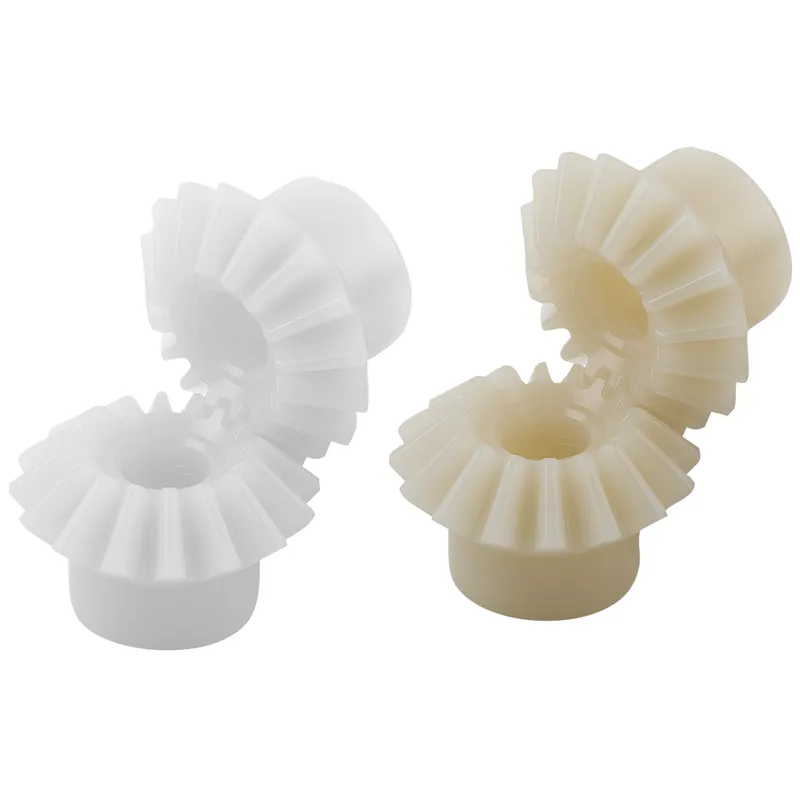
Additional information
| Edited by | Yjx |
|---|
